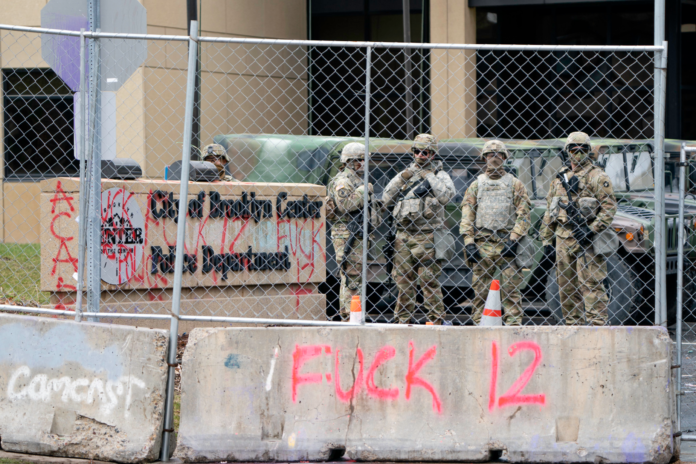
Law enforcement leaders urged the Brooklyn Center City Council to reject the mayor’s proposal to have unarmed civilians handle traffic stops in the Minneapolis suburb.
Mayor Mike Elliott called a special meeting last weekend to introduce the resolution, which the council is expected to vote on Saturday.
The resolution, named for Daunte Wright, a Brooklyn Center resident who was killed in an officer-involved shooting last month, and Kobe Dimock-Heisler, a 21-year-old with autism who was fatally shot by Brooklyn Center officers after he charged at them with a knife, calls for an “unarmed civilian Traffic Enforcement Department” to enforce “all non-moving traffic violations in the city.”
The measure comes with several other sweeping police-reform proposals, including a “Community Response Department” of medical and mental health professionals who would respond to calls involving people who are “primarily experiencing” a medical, mental health, or disability-related issue.
Three law enforcement unions sent a letter to Elliott and the City Council Friday asking to be involved in the discussion.
“As representatives of the law enforcement community in the state of Minnesota, we are concerned that a vote on the proposed resolution would be considered without the necessary input from all affected parties,” says the letter.
Authorizing non-licensed civilians to respond to traffic violations stands on shaky legal ground, the letter claims, and would “heighten the threat to those individuals and the public.”
“This, in turn, would have the unintended but likely consequence of offenders ignoring, fleeing or confronting the civilians, thereby endangering others in the vicinity or on the roadway,” the letter adds.
According to the letter, Elliott’s proposal would prohibit “custodial arrests or consent searches for non-felony offenses,” thus preventing arrests from being made for offenses like driving under the influence or reckless driving.
“This is contrary to reason, state law and public safety,” states the letter, which was signed by Minnesota Police and Peace Officers Association Executive Director Brian Peters, Law Enforcement Labor Services Executive Director Jim Mortenson, and Minnesota Sheriffs’ Association Executive Director Bill Hutton.
Today MPPOA joined with other law enforcement organizations opposing a proposed Brooklyn Center ordinance would make the community – and law enforcement officers – less safe. Most of their proposal is also illegal under state law. Read our letter here: pic.twitter.com/wFfGtYlodg
— Minnesota Police and Peace Officers Association (@MNPoliceAssn) May 14, 2021
Elliott believes his resolution will help “transform our system so that police are not the only available response for everything.”
Elliott’s city was home to 10 days of protests and riots last month following Wright’s death. Throughout the unrest, the mayor frequently criticized the law enforcement response and advocated for unarmed traffic enforcement. Wright was killed after he attempted to flee from a traffic stop.
“The city’s residents and its law enforcement officers deserve better from their city,” the letter from police leaders concludes. “The city’s proposed drastic revamping of traffic criminal laws and procedures in the midst of an increase in violent crime is misguided. This makes officers and community members less safe.”
Brooklyn Center City Attorney Troy Gilchrist said the adoption of the resolution “establishes goals and commits the city to working to achieve them,” but would not “constitute a final action on the policies it contains.”
“There are clearly a range of legal issues that will need to be considered as part of developing the recommendations,” he wrote in response. “In short, all of the goals, directives, and outcomes expressed in the Act must be carried out in accordance with the law.”
















